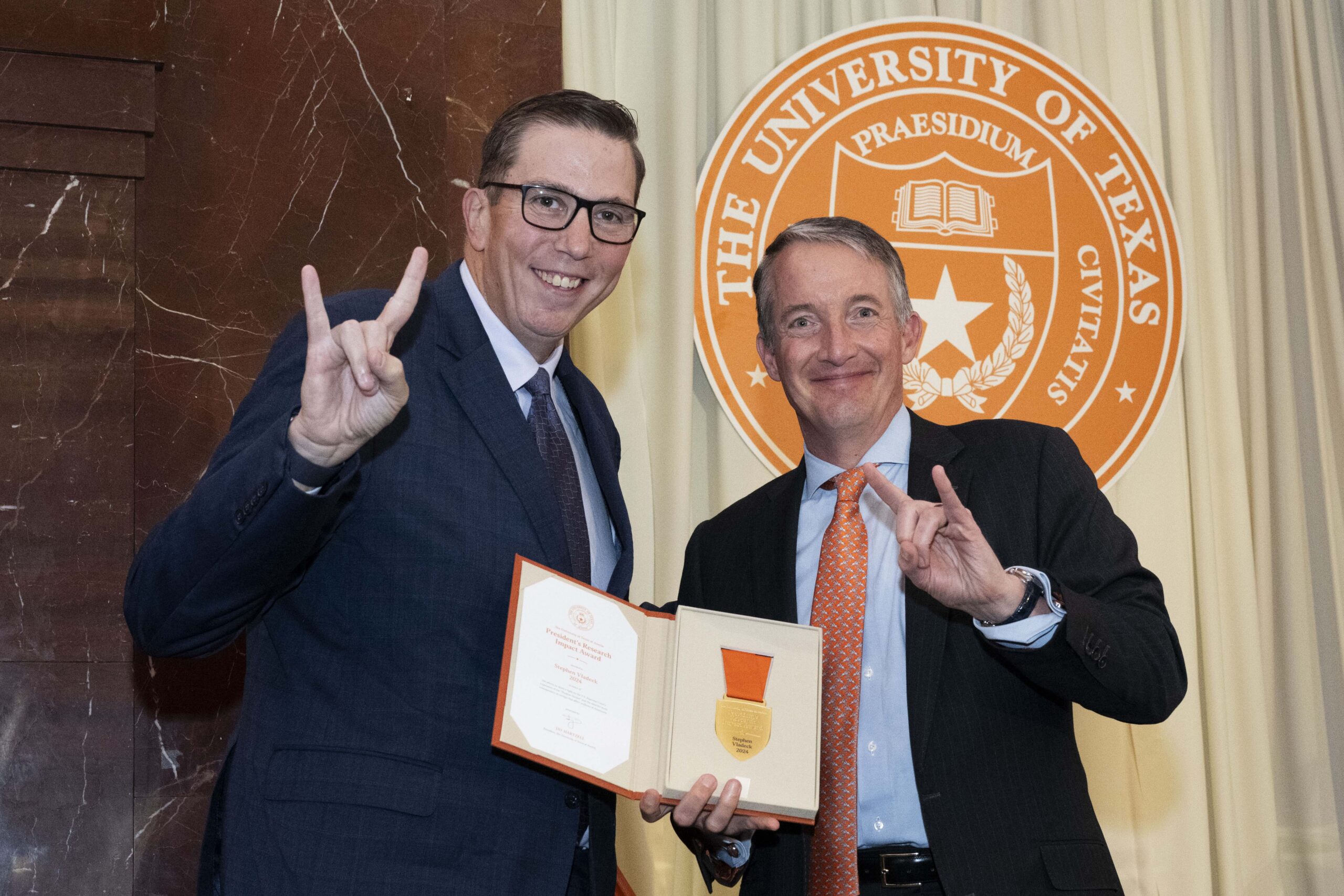
An expert on the federal courts and constitutional law and the creator of a code to predict hurricane storm surges have been named the 2024 recipients of The University of Texas at Austin President’s Research Impact Award.
Stephen Vladeck, the Charles Alan Wright Chair in Federal Courts at the School of Law, and Clint Dawson, the Cockrell Family Regents Chair in Engineering #2 and director of the Computational Hydraulics Group at the Oden Institute, were recently presented with the award. President Jay Hartzell established the President’s Research Impact Award in 2023 to recognize University researchers whose scholarly or creative endeavors have changed lives and the way we look at and understand the world.
“Clint Dawson and Stephen Vladeck epitomize the different ways in which Longhorns are having a direct impact on lives and communities across Texas and throughout the world and the basis of our mission to become the highest-impact public research university,” Hartzell says. “Dozens of highly ranked programs, elite faculty and students, and some of the most robust research funding in the world—combined with the culture and economy of Austin—put us in an especially strong place to maximize the impact of what Longhorns learn and discover. We are positioned to lead the next great discovery in AI, technology, life sciences and health care, energy and the environment, and so many other disciplines.”
Vladeck, who joined the UT faculty in 2016, is the foremost legal scholar researching and raising awareness about the U.S. Supreme Court’s expansion of the “shadow docket” and the need for more transparency in rulings that affect millions of Americans.
The Supreme Court resolves cases via two channels: the merits docket, where the justices hand down written opinions, and everything else—from cases that will and will not receive full merits consideration to time-sensitive decisions such as death penalty appeals.
These latter decisions, which comprise as much as 99% of the court’s rulings in any given year, are issued without public hearings or full opinions, meaning there’s little indication as to why the court has ruled the way it has, hence the “shadow docket” moniker.
Vladeck’s work, including his New York Times bestseller “The Shadow Docket,” has illuminated how the Supreme Court has increased the real-world effects of orders it hands down via the shadow docket—often without the time-sensitive justification. More fundamentally, it has reshaped how we understand the court as an institution.
“The justices are paying attention…and perhaps most impressively, the justices seem to have changed their practices in response to Professor Vladeck’s criticism,” said Leah Litman, professor of law at the University of Michigan. “The court (has begun) to move some cases or requests that would have previously been handled on the shadow docket onto the regular docket and decide them after full briefing and oral argument, sometimes on a more expedited basis.”
“By any measure, Steve Vladeck is among the most impactful legal scholars in the academy today, thanks both to his current work on the Supreme Court’s ‘shadow docket’ and to his larger and sweeping body of work regarding the role of the entire federal court system in our democracy,” says Texas Law Dean Bobby Chesney. “His knowledge is encyclopedic, his insights piercing, and his conclusions influential. The fact that he’s a master teacher as well is icing on the cake.”
Dawson, a computational engineer who joined UT in 1995, was instrumental in developing a simulation code that is used worldwide in coastal ocean modeling and hurricane storm surge predictions. This helps state and local government leaders know whether to evacuate neighborhoods and where to stage resources, saving lives and property.
Dawson works closely with emergency response organizations across the state, and his research has influenced the action plans for major storms that have hit Texas and Louisiana since 2005. Having access to the high-performance computing power at UT’s Texas Advanced Computing Center has been critical to the success of his research.
“The work Clint is engaged in with the SSPEED Center here in Houston is about potentially preventing the worst environmental disaster in United States history and saving the lives of thousands of coastal residents,” said Jim Blackburn, co-director of the Severe Storm Prediction, Education, and Evacuation from Disaster Center at Rice University. “The ability to predict the surge arising from storms coming ashore at different locations and from different directions at different magnitudes is critical to understanding both the need for action and what type of action to design.”
Up to four UT researchers who represent any discipline can be selected annually to receive the President’s Research Impact Award. Each recipient is honored with a $10,000 prize and medal to recognize research that has an impact on society, the economy, or the human imagination. The Office of the Vice President for Research, Scholarship and Creative Endeavors oversees the award nomination and selection process.
A version of this story originally appeared on UT News.
